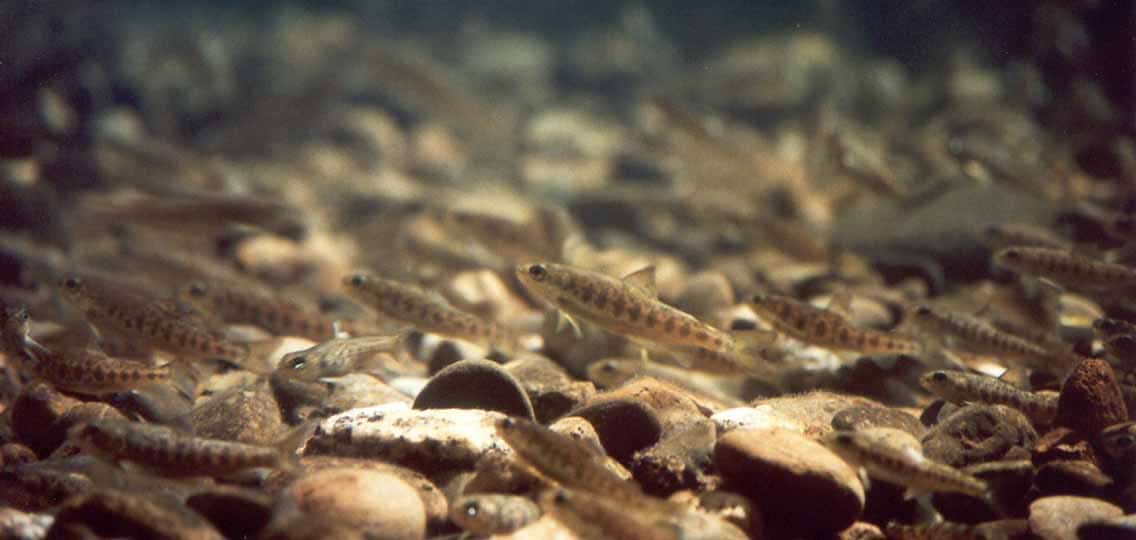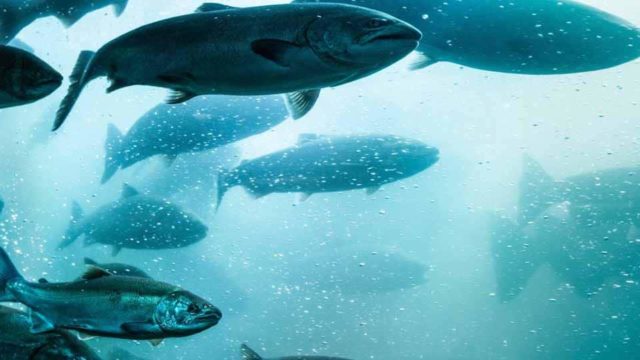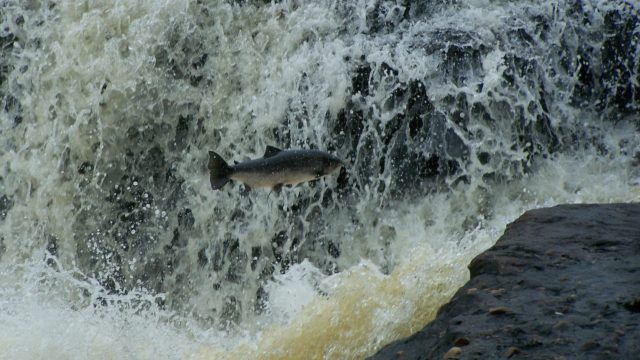Wild salmon are known to be natural navigators. They travel thousands of kilometres to spawn in the rivers where they were born — sometimes even to the same gravel beds where they hatched. They are central to the cultures, diets, and economies of many Indigenous Peoples. But across Canada, wild salmon are under threat and their populations have declined steeply in recent years on both the Pacific and Atlantic coasts.
Whether Ecojustice is launching litigation, sending letters to elected officials or encouraging members of our community to lend their voices, we’re working hard inside and outside the courtroom to protect wild salmon.
And there are many others committed to fighting for this ocean icon. Often, First Nations communities are front and centre in leading the way on protection efforts.
Most recently, the Homalco, Klahoose, K’ómoks, Kwaikah, Tla’amin, We Wai Kai and Wei Wai Kum First Nations led the push for the phase out of open-net fish farms in the waters around British Columbia’s Discovery Islands. This historic victory means that existing fish farms must close by June 30, 2022 and no new fish farms will be able to open in the region.
While this is a promising step for the recovery of wild Sockeye salmon, we’ve recently learned that international aquaculture companies are seeking a judicial review of the federal government’s decision.
Much like salmon on the west coast, Atlantic salmon play an important role for those that live along the coasts of Newfoundland and Labrador, New Brunswick, Nova Scotia, and Prince Edward Island. They are a source of food and hold cultural significance for many First Nations and Inuit communities.
That’s why since the opening of Ecojustice’s Halifax office, we’ve dedicated a portion of our efforts to protecting wild Atlantic salmon and ensuring the aquaculture industry and provincial governments are held accountable for following existing laws.
Upholding victories in Newfoundland and Labrador
According to an Atlantic Salmon Federation report in June 2018, wild Atlantic salmon populations have declined 45 per cent since 2015. As an indicator species, there are a number of causes for this decline we can point to.
Wild salmon on the Atlantic coast have had a hard time adapting to the impacts of climate change, warming rivers and human development that alters waterways and landscapes. They also face threats from open-net fish farming, including farmed fish transmitting diseases and parasites to wild fish.
Despite the uphill battle for survival faced by this species, the Government of Newfoundland and Labrador still wants to double fish farming in the province.
That’s why last week, we were in court to defend a precedent-setting legal victory that confirmed the importance of conducting robust environmental assessments before fish farming projects, like the expansion of the Indian Head Hatchery to facilitate transferring millions more fish to the ocean, get the go-ahead.
Quick background: Northern Harvest’s Indian Head Hatchery expansion was scoped to exclude the project’s marine portion. In other words, the Indian Head Hatchery nearly got away with upping its production capacity by 50 per cent — or the addition of 2.2 million smolt to open-net pens in the ocean — without proper assessment
Ecojustice intervened on behalf of local groups and the Supreme Court of Newfoundland and Labrador put a stop to that project. The court confirmed the need for the province to ensure that when a company proposes expanding its aquaculture project, the government must assess it in a responsible and precautionary manner.
We are optimistic that the Newfoundland and Labrador Court of Appeal will confirm the lower court’s ruling. The fate of wild salmon and coastal ecosystems in Atlantic Canada are counting on it.
Ensuring government action for Nova Scotia’s aquaculture industry
The aquaculture industry in Nova Scotia has many of the same issues we’ve seen in Newfoundland and Labrador, including lack of enforcement from government officials.
For more than a decade, Kelly Cove Salmon has operated outside of its lease boundaries at five of its open-net pen sites in Nova Scotia. This means that it’s possible the company has been allowed to have more cages, and therefore more fish, on each site than what is permitted by its lease.
The Nova Scotia government has knowingly let Kelly Cove Salmon break the law. It’s up to the responsible ministries to enforce the province’s Aquaculture Lease and Licence Regulations and make sure companies follow the rules. This includes a requirement for Kelly Cove Salmon to hold public information meetings before submitting lease expansion applications for these sites.
The government has never done that. Ecojustice, along with our clients, are saying enough is enough. Nova Scotia communities must have the opportunity to exercise their right to voice concerns about aquaculture projects.
In mid-January we sent a demand letter to Minister of Fisheries and Aquaculture Keith Colwell and Minister of Environment Gordon Wilson calling on them to do two simple things:
1. Reject Kelly Cove Salmon’s noncompliant applications for lease expansions and require the company to hold public information meetings; and
2. Make sure Kelly Cove Salmon comes into compliance with its lease boundaries at all five non-compliant sites.
We’ve given them until March 12 to get back to us. While we don’t have immediate plans to litigate this matter, it’s not off the table either. We’ll keep you in the loop on where things land.
Coming up next
In the coming months, we’ll be jumping in to support efforts to strengthen Canada’s first ever federal Aquaculture Act.
We will also be keeping an eye on Kelly Cove Salmon a bit more. More than five years after the moratorium was lifted on new open-net pen aquaculture sites, Kelly Cove Salmon submitted an application to open two new open-net pen sites, and expand an existing site, in Liverpool Bay, N.S. If approved, this could lead to a flood of new open-net fish farms in the province — something our clients say would be bad news for wild fish stocks.
Stay tuned for more details in the months ahead. You’re not going to want to miss out.




